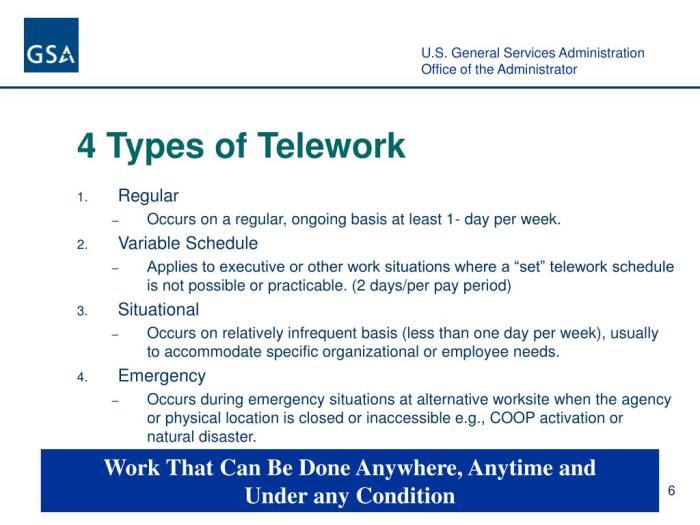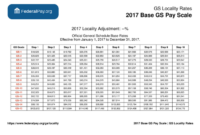GS Pay and Telework: Balancing Flexibility and Accountability sets the stage for this enthralling narrative, offering readers a glimpse into a story that is rich in detail and brimming with originality from the outset. The rise of GS Pay and telework is a game-changer for government agencies, offering a blend of flexibility and productivity that’s hard to resist.
It’s not just about working from home; it’s about embracing a new era of work, one where employees can thrive in a dynamic and evolving environment.
This article explores the benefits and challenges of GS Pay and telework, delving into the strategies needed to strike the perfect balance between flexibility and accountability. We’ll examine how these programs impact employee morale, retention, and the overall effectiveness of government agencies.
Buckle up, because this journey is about to get interesting!
The Rise of GS Pay and Telework: GS Pay And Telework: Balancing Flexibility And Accountability
The concept of GS Pay and telework has evolved significantly over time, reflecting broader societal shifts and technological advancements. Initially, these practices were limited to specific sectors and roles, but their adoption has accelerated in recent years, driven by a confluence of factors.
This chapter delves into the historical context of GS Pay and telework, examining the key drivers behind their increasing prevalence and providing examples of successful implementations.
Historical Context of GS Pay and Telework
The origins of GS Pay and telework can be traced back to the early days of computing and telecommunications. The development of remote access technologies, such as dial-up modems and early internet connections, enabled employees to work from locations outside traditional office settings.
However, these early forms of telework were primarily confined to specific industries, such as customer service and software development, where remote work was considered feasible.The concept of GS Pay, or government salary pay, has a long history, dating back to the establishment of the United States Civil Service in 1883.
Initially, GS Pay was designed to ensure a fair and competitive system for government employees, with salary levels based on job responsibilities and qualifications. However, the traditional model of GS Pay, with its emphasis on in-person work, has been challenged by the rise of telework and the increasing demand for flexible work arrangements.
Factors Driving the Adoption of GS Pay and Telework
The increased adoption of GS Pay and telework can be attributed to several key factors, including:
- Technological Advancements:The rapid advancement of technology has played a crucial role in enabling GS Pay and telework. The widespread availability of high-speed internet, video conferencing software, and cloud-based collaboration tools has made it easier for employees to work remotely and maintain productivity.
- Changing Workforce Demographics:The changing demographics of the workforce, with increasing numbers of millennials and Gen Z employees who value work-life balance and flexibility, has also contributed to the rise of GS Pay and telework. These younger generations are more likely to seek employers who offer remote work options and flexible work schedules.
- Societal Shifts:Societal shifts, such as the increasing importance of work-life balance, the growing prevalence of dual-income households, and the desire for greater flexibility in work arrangements, have also fueled the adoption of GS Pay and telework. These factors have led many employees to seek employers who offer more flexible work options, including remote work and flexible schedules.
Successful Implementations of GS Pay and Telework Programs
Several government agencies and organizations have successfully implemented GS Pay and telework programs. These programs have often been driven by a combination of factors, including cost savings, increased employee productivity, and improved employee satisfaction.
- The United States Department of Agriculture (USDA):The USDA has implemented a comprehensive telework program that allows eligible employees to work remotely. The program has been credited with improving employee morale, reducing office space costs, and increasing productivity.
- The General Services Administration (GSA):The GSA has also implemented a successful telework program that has enabled many employees to work remotely. The program has been cited as a model for other government agencies seeking to implement telework programs.
- The Department of Homeland Security (DHS):The DHS has also implemented a telework program that has allowed many employees to work remotely. The program has been credited with improving employee morale, reducing office space costs, and increasing productivity.
Benefits of GS Pay and Telework
The adoption of GS Pay and telework in the government sector has ushered in a new era of flexibility and efficiency. These initiatives offer numerous advantages for both employees and agencies, fostering a more productive and fulfilling work environment.
Benefits of GS Pay for Government Employees
GS Pay, the General Schedule pay system, provides a standardized framework for determining salaries for federal employees. This system offers a number of benefits for government employees, including:
- Increased Flexibility: GS Pay allows for greater flexibility in work arrangements, enabling employees to pursue alternative work schedules, such as compressed workweeks or flextime. This increased flexibility can enhance work-life balance, allowing employees to better manage personal commitments alongside their professional responsibilities.
- Improved Work-Life Balance: The flexibility afforded by GS Pay can significantly improve work-life balance for government employees. This, in turn, can lead to increased job satisfaction, reduced stress levels, and improved overall well-being.
- Potential for Higher Salaries: GS Pay is a performance-based system, meaning that employees can earn higher salaries by demonstrating exceptional performance and achieving career advancements. This incentivizes employees to strive for excellence and contributes to a more motivated and productive workforce.
Benefits of Telework for Government Agencies, GS Pay and Telework: Balancing Flexibility and Accountability
Telework, also known as remote work, has become increasingly prevalent in the public sector, offering a range of advantages for government agencies:
- Reduced Office Space Costs: Telework can significantly reduce the need for physical office space, leading to substantial cost savings for government agencies. By enabling employees to work remotely, agencies can downsize their office footprint, freeing up valuable resources that can be allocated to other critical initiatives.
In the ever-evolving landscape of the federal workforce, finding that sweet spot between flexibility and accountability is paramount. As administrative assistants navigate the intricacies of the GS Pay Scale, a thorough understanding of the system is essential. For a comprehensive guide on navigating the GS Pay Scale 2024, specifically tailored for administrative assistants, check out Navigating the GS Pay Scale 2024: A Comprehensive Guide for Administrative Assistants.
Armed with this knowledge, you can confidently embrace the opportunities for both personal and professional growth that telework and the GS Pay system offer.
- Increased Employee Productivity: Studies have shown that telework can enhance employee productivity. When employees have the flexibility to work from home or other remote locations, they often experience fewer distractions and a more conducive work environment, leading to improved focus and efficiency.
- Improved Access to a Wider Talent Pool: Telework allows government agencies to recruit and retain talent from a broader geographical area, expanding the pool of qualified candidates. This can lead to a more diverse and skilled workforce, enriching the agency’s capabilities and expertise.
Impact of GS Pay and Telework on Employee Morale and Retention
The implementation of GS Pay and telework has had a positive impact on employee morale and retention within government agencies.
“Studies have shown that employees who have access to flexible work arrangements, such as telework, are more likely to report higher levels of job satisfaction and are less likely to leave their jobs.”
Society for Human Resource Management (SHRM)
The flexibility and autonomy provided by these initiatives contribute to a more positive and fulfilling work experience, leading to increased job satisfaction and reduced turnover rates. This, in turn, helps government agencies retain valuable employees and build a more stable and engaged workforce.
Challenges of GS Pay and Telework

While GS Pay and telework offer numerous benefits, their implementation presents several challenges that need to be carefully addressed to ensure successful adoption and long-term sustainability.
Ensuring Fair Compensation and Equity
Ensuring fair compensation and maintaining equity among employees is a crucial aspect of implementing GS Pay. This involves creating a transparent and objective pay structure that accurately reflects the value of different roles and responsibilities, regardless of whether an employee works remotely or in the office.
Navigating the dynamic landscape of GS Pay and telework demands a delicate balance. To ensure both flexibility and accountability, a deep understanding of the current pay scale is essential. The GS Pay Scale 2024 for Human Resources: A Comprehensive Guide provides invaluable insights into the compensation structure, empowering HR professionals to effectively manage remote workforces while fostering a thriving and productive environment.
This knowledge paves the way for a successful blend of work-life harmony and performance excellence.
This is a complex task that requires careful consideration of factors such as location, experience, skills, and performance. Failure to address these issues can lead to dissatisfaction and resentment among employees, potentially undermining the benefits of GS Pay.
- Determining Fair Pay Rates:Establishing fair pay rates for remote employees requires considering factors like cost of living in different locations, local labor market conditions, and the value of remote work skills. This involves careful analysis and benchmarking to ensure that remote workers are compensated fairly compared to their office-based counterparts.
- Addressing Pay Discrepancies:Pay discrepancies between remote and office-based employees can arise due to differing cost of living, market conditions, or perceptions of value. It’s essential to address these discrepancies proactively through transparent pay scales, regular reviews, and performance-based adjustments.
- Maintaining Equity:Ensuring that remote employees have equal opportunities for career advancement and development is crucial for maintaining equity. This involves providing access to training, mentorship, and other development programs, regardless of location. It also requires establishing clear performance metrics and promotion criteria that apply equally to both remote and office-based employees.
Managing Telework Effectively
Managing telework effectively requires establishing clear communication channels, fostering collaboration, and ensuring accountability among remote employees. This involves creating a culture of trust and transparency, providing the necessary tools and resources, and implementing effective performance management systems.
- Maintaining Communication:Effective communication is essential for successful telework. This involves establishing clear communication protocols, using various tools like video conferencing, instant messaging, and project management platforms, and encouraging regular check-ins and feedback sessions.
- Fostering Collaboration:Collaborating effectively with remote employees requires using collaborative tools and platforms, establishing clear roles and responsibilities, and promoting teamwork through virtual events and activities. This involves creating a sense of community and shared purpose among remote workers.
- Ensuring Accountability:Accountability is crucial for maintaining productivity and performance among remote employees. This involves setting clear expectations, tracking progress, providing regular feedback, and implementing performance management systems that are adapted to the telework environment.
Addressing Security Risks
Telework introduces new security risks that need to be addressed proactively. These risks include data breaches, unauthorized access, and malware infections. Implementing robust security measures is crucial to protect sensitive information and ensure the safety of both employees and the organization.
- Data Protection:Organizations need to implement robust data protection measures, such as encryption, access control, and data loss prevention tools, to safeguard sensitive information from unauthorized access. This involves training employees on data security best practices and enforcing strong password policies.
The GS Pay scale offers a path toward a fulfilling career in IT, where flexibility and accountability intertwine. Understanding the nuances of the GS Pay Scale 2024 is crucial for navigating this journey, and Navigating the GS Pay Scale 2024: A Comprehensive Guide for IT Professionals provides invaluable insights.
By mastering the system, you can achieve a balanced work-life harmony, where your dedication is recognized, and your potential is unlocked.
- Device Security:Ensuring the security of employee devices is essential. This involves implementing device management policies, requiring strong passwords and multi-factor authentication, and installing anti-virus and malware protection software. Regular security updates and vulnerability assessments are also crucial.
- Network Security:Organizations need to secure their network infrastructure, including firewalls, intrusion detection systems, and VPNs, to prevent unauthorized access and data breaches. Regular network security audits and penetration testing are essential for identifying and mitigating vulnerabilities.
Strategies for Balancing Flexibility and Accountability
The successful implementation of GS Pay and telework programs hinges on finding a balance between the benefits of flexibility and the need for accountability. This balance ensures that employees are empowered to work effectively while maintaining productivity and adherence to organizational goals.
Framework for Balancing Flexibility and Accountability
A robust framework is crucial for striking this balance. It should Artikel clear expectations for both employees and managers, encompassing aspects such as performance metrics, communication channels, and regular performance evaluations.
“A well-defined framework provides a roadmap for success, ensuring that flexibility doesn’t compromise accountability and vice versa.”
Best Practices for Managing Remote Employees
Effective management of remote employees requires a tailored approach. Here are some best practices:
- Performance Monitoring:Regularly track and evaluate performance using key performance indicators (KPIs) relevant to individual roles and team goals. Implement tools for real-time progress monitoring and provide feedback to employees. Examples of such tools include project management software, time-tracking applications, and online collaboration platforms.
- Communication Protocols:Establish clear communication channels and protocols for both formal and informal communication. This includes scheduled team meetings, instant messaging platforms, and project management tools. Regular communication fosters transparency and ensures everyone is on the same page.
- Training Programs:Invest in training programs that equip remote employees with the skills and tools necessary for effective collaboration and remote work. This includes training on communication strategies, virtual collaboration tools, and time management techniques.
Essential Elements for Successful Implementation
A checklist of essential elements ensures a smooth and successful implementation of GS Pay and telework programs:
- Clear Policies:Develop comprehensive policies that address all aspects of telework, including eligibility criteria, work arrangements, performance expectations, and communication protocols. This ensures clarity and consistency across the organization.
- Robust Technology Infrastructure:Invest in reliable technology infrastructure that supports remote work, including secure network access, collaboration tools, and virtual meeting platforms. This ensures employees have the necessary tools to perform their duties effectively.
- Strong Leadership Support:Cultivate a culture of trust and support among leadership, encouraging open communication and flexible work arrangements. This fosters a positive and productive work environment for remote employees.
Future Trends in GS Pay and Telework
The future of GS Pay and telework in the public sector is likely to be shaped by advancements in technology, changing work patterns, and evolving societal expectations. These factors will create opportunities for increased flexibility and productivity, but also pose challenges that agencies must address to ensure their programs remain relevant and effective.
The Rise of Hybrid Work Models
The pandemic accelerated the adoption of telework in the public sector, and this trend is likely to continue. However, many agencies are finding that a purely remote work model is not sustainable in the long term. Instead, hybrid work models that combine in-person and remote work are becoming increasingly popular.
This approach allows employees to enjoy the benefits of both flexibility and collaboration, while also ensuring that agencies can maintain a strong sense of community and culture.
Increased Focus on Employee Wellbeing
As the lines between work and personal life continue to blur, government agencies are increasingly focusing on employee wellbeing. This includes providing resources and support for mental health, physical fitness, and work-life balance. Agencies that prioritize employee wellbeing are likely to attract and retain top talent, which will be crucial in a competitive job market.
Advancements in Technology
Technology will continue to play a crucial role in the evolution of GS Pay and telework. Advancements in areas such as artificial intelligence, cloud computing, and cybersecurity will enable agencies to improve efficiency, enhance collaboration, and strengthen security. For example, AI-powered tools can automate routine tasks, freeing up employees to focus on more strategic work.
Cloud-based platforms can facilitate collaboration across different locations and devices. And advanced cybersecurity measures can help to protect sensitive data and ensure the integrity of government systems.
Evolving Societal Expectations
The public sector is not immune to the changing expectations of the workforce. Employees are increasingly demanding flexibility, autonomy, and a sense of purpose in their work. Agencies that fail to adapt to these expectations may struggle to attract and retain talent.
To address this, agencies should consider offering flexible work arrangements, providing opportunities for professional development, and creating a culture of transparency and accountability.
Closing Notes
The future of work is here, and it’s a hybrid of traditional and modern approaches. GS Pay and telework are paving the way for a more flexible and efficient public sector, but it’s crucial to address the challenges and implement effective strategies to ensure success.
By embracing innovation and adopting best practices, government agencies can create a work environment that empowers employees, enhances productivity, and delivers exceptional results. The key is to strike that perfect balance between flexibility and accountability, fostering a culture of trust and collaboration that drives success for everyone.


